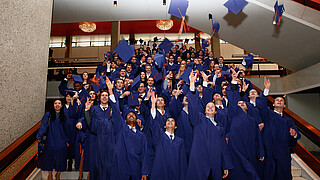The report indicates that employers need to move fast if they want to recruit RSM graduates. Almost three-quarters of respondents found a job within three months of starting to look for one. And astonishingly, more than half secured their first step on the career ladder before their graduation. No wonder – they start early. About a fifth of MSc students start looking for a job six months before they complete their studies. A month away from graduation, 54 per cent are actively searching. And the positions they take up are demanding and at an elevated level – almost three-quarters of respondents say that their job requires them to have an MSc degree.
Students’ performance during their studies maintained RSM’s high standards, with a similar Grade Point Average (GPA) to that set in previous years.
A source of international managers for the Netherlands
The survey also shows that RSM is a source of truly international and highly skilled management employees for Dutch organisations, helping to keep the Dutch tradition of an international and trading nation. Students come from dozens of different countries, and more than two-thirds of those originating from outside Europe actually stay in the Netherlands after graduation.
And they are also adventurous; almost a third went to work in countries other than their country of origin or the Netherlands after they graduated from RSM, with graduates from 2014 going to work in 42 different countries for 237 different employers, most of them large multinational companies with more than 10,000 employees.
It’s easy to understand the appeal of working internationally; graduates are more likely to get permanent contracts if they work anywhere in the world other than the Netherlands.
Confidence in the Dutch economy
But it seems that there is confidence in the Dutch economy because despite the lower likelihood of a permanent contract, average monthly salaries of graduates working for Dutch organisations are €104 more than the previous year – and higher than the average monthly salary of the average master graduate in the Netherlands
But industry and country appear to make no difference to the hours worked by our graduates. Their working hours are similar wherever they are in the world, at around 39.5 hours in a regular working week.
Companies meet students on campus
Graduates most frequently find employment by using their own networks, doing an internship or creating networks via social networking sites, such as LinkedIn. They mentioned that organised opportunities for companies to meet and interact with students on campus were particularly useful – these include company presentations or the annual student-organised events STAR Management Week and the Erasmus Recruitment Days. There are also many other ways for companies to interact with RSM students.
Who are they?
The class of 2014 cohort represented 41 different nationalities; 60 per cent were Dutch, 30.5 per cent came from other countries in the European Economic Area (EEA), and 9.5 per cent came from outside the EEA. Their average age at graduation was 24.5, with the youngest just 21 and the oldest at 40 years old.
To read more about RSM graduates such as average salaries and backgrounds, see the RSM 2015 Graduate Placement Report.





